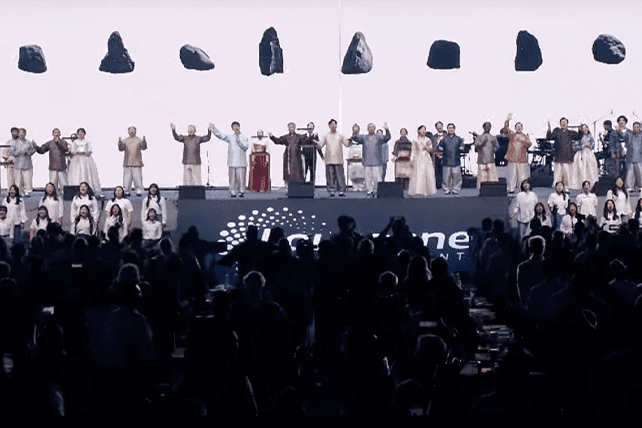Editor’s note: This article is part of forum discussing the fourth Lausanne Congress. It is not an official Lausanne Movement forum but an opportunity for Lausanne delegates to share their thoughts about the fourth Lausanne Congress, the Seoul Statement, and the future of the mission. You can read the entire series, from diverse voices around the world here.
The year is 1974 and Lausanne was born. That same year, Harrison Christian Kiarie Mungai was born to Rev. David Mungai Kiarie of National Council of Churches in Kenya—also a Presbyterian church tentmaker. As destiny would have it, Lausanne and Christian Mungai aka “BlaqRhyno” would meet at Mariners Church in Irvine, California, where I have been on the outreach staff for over 17 years. Both Lausanne and Christian would celebrate their 50th birthdays in the same year.
As you can imagine, it was a gift for me to be invited to Lausanne 4. Being there was a myopic glimpse into what Revelation 5:9 sights, every, nation, tribe, and tongue—5,200 people from 204 nations. I could have been there and not listened to a single talk and it would have been completely worthwhile.
The Korean church’s hospitality was extravagant and humbling. I saw the Korean church come together to bless and serve the world in a very beautiful way. We applaud the brothers and sisters who showed us what high honor and service is. There are so many things that stood out for me, but seeing that I am not the best of writers and more of a storyteller, I’ll leave for dialogue more than this monologue format. When we get the chance to meet, I will share stories about the epic sound of singing together one song in different languages, the voices of incredible image bearers from places of persecution and the joy exuded in the most difficult of times, I will share about the group times we shared in both the plenary sessions and the collaborative action breakout groups, which in my humble opinion was most enthralling and compelling.
However, the one thing I will highlight in this short opus, is what has stood out in my reflection of L4. We saw the beauty of the church in its potency as we embraced and engaged the theme “Let the Church declare and display Christ together.” That theme was formative for me as a young missions leader at Mariners Church, where I was first introduced to Lausanne. Our leaders, Kenton and Laurie Beshore, held “Whole Church, Whole Gospel to Whole world” in high regard as a rally cry to engage in missions both locally and globally.
As my first foray into the church missions space from a community development background, it formed a solid base for my growth in integral missions. Incidentally, the more I have learned, the more I have been attuned to how much more there is for me to learn. The one thing that has resonated from my L4 reflection is how the quest for unity in diversity is a gargantuan task. Most of the reviews I have read have all been vital for hearing various perspectives. As has been said before, “we are all prisoners of our own cultures and ideologies.”
Ruth Padilla shared a scintillating and challenging talk on justice. L4 apologized for some of her sentiments. Padilla then went on to extrapolate her thinking while humbly making an apology. Another group of thinkers and theologians from North America went on to share how the Seoul Statement was light on evangelism. A couple of Korean theologians shared how there was too much emphasis on evangelism and missed out on other issues such as environmental care. Another leader and theologian from South Pacific shared how L4’s emphasis on collaboration was not attuned to the Majority World’s posture of collaboration, which has been a predominant posture among them.
Some of my Asian and African brothers shared how vastly different the regional breakouts were. As an example, the Asian gathering was about connection and affirmation of each other. The North American gathering was further content and next steps from Lausanne. A Kenyan gathering was about meeting the Kenyan ambassador to Korea. And this is just from my very myopic view and from having friends from these regions.
What was glaringly missing from this was a sense of curiosity and self-examination. I am yet to see a review that is written from the perspective of challenging and learning from another perspective. It’s been mostly a double-down on deeply held perspectives and views.
The question therefore begs, will a divided church ever reach a broken and fragmented world? And what will it take from the body of Christ to function from a posture of deference and eagerness to learn from each other, rather than lob criticism at each other?
An Algerian proverb reminds me that when you get closer to what is seemingly an inanimate object, you realize it was really your brother or your sister. Ultimately, these perspectives are valid and yet could be reductionistic as long as we don’t incarnate curiously and meekly, with the posture that all we want, we already have. The grace of our Lord Jesus Christ.

